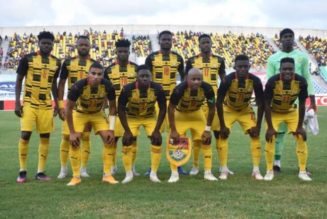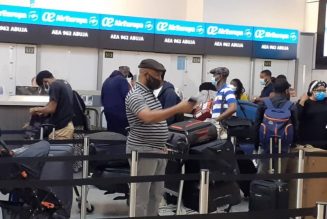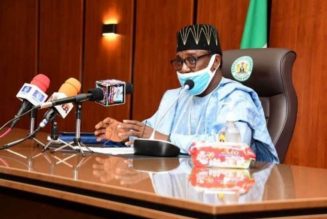
The ravaging effect of Coronavirus (COVID-19) was, perhaps, the biggest challenge faced by stakeholders in the road sub sector of the construction industry in 2020.
As the virus gained ground, several contractors soon abandoned work and shut their operations, consequently, many hitherto gainfully employed Nigerians were thrown into the labour market.
Even when the government later introduced partial lockdown measures, the number of workers on site was scaled down by many contractors in line with COVID-19 protocols, which slowed down progress of work.
Virtually all road projects in Lagos State suffered the effect of the pandemic, with every project having its own peculiar challenge.
The reconstruction of 46km Agbara-Seme section of the Lagos-Badagry Expressway project awarded to CGC Nigeria Ltd. on October 24, 2018 at the cost ofN63.2 billion was the worst hit.
Apart from coping with the restriction guidelines on site, some of its senior engineers and supervisors, including the project manager who had traveled to China on holiday in December 2018 could not return to Nigeria.
This was due to the outbreak of the virus in Wuhan leading to lockdown in the country, hence flight restrictions were imposed.
The few workers of CGC contractors handling the project eventually bowed to pressure and ran out of site with the outbreak of the virus in Lagos.
Motorists on the Lagos-Badagry Expressway soon began to lament as they had to daily cope with bad state of the road from Agbara to Badagry.
Wizchino Engineering Ltd., contractors handling Section Two of Lagos-Badagry Expressway rehabilitation project also suspended work on the site, from Igboelerin Junction to Agbara.
Work on Section One, from Eric Moore Road to Mazamaza, handled by CCECC, was not spared by coronavirus.
One after the other, all construction firms communicated their withdrawal from site to the Federal Ministry of Works and pulled out of construction sites in Lagos, leaving roads and bridges in terrible shapes.
The Federal Controller of Works in Lagos, Mr Olukayode Popoola, who assumed office in Lagos on March 27, raised an alarm that highways and bridges in the state had recorded a major setback due to the COVID-19 pandemic.
Popoola alerted road users that some construction giants handling major road projects in Lagos were “shutting down site” over the coronavirus pandemic.
The firms, which included Julius Berger (JB), Reynolds Construction Company Ltd., (RCC) and CGC Nigeria Ltd., had circular notified the Federal Ministry of Works and Housing on the need to shutdown down due to the coronavirus.
However, Hitech, sub contractor handling the Apapa-Oshodi-Ojota-Oworonsoki Expressway reconstruction and rehabilitation project on behalf of the Dangote Group, remained on site for some time but had to cut down its workforce in compliance with the COVID-19 safety guidelines.
Apart from actual construction works on site, materials imported for various projects were trapped abroad.
For instance, the Alaka/Eko Bridge had to shut down on March 10 to prevent its collapse as components for its rehabilitation were trapped in transit.
Contractors gradually began to return to site, after the total lifting of COVID-19 lockdown restrictions, while still observing protocols, with the exception of those handling Section Three of the Lagos-Badagry Expressway who were trapped in China till the last quarter of 2020.
Normalcy was restored when the CGC workers, including the project manager, were finally able to return to Nigeria from the coronavirus imposed holiday to continue work.
A relieved Federal Controller for Works in Lagos State, Mr Olukayode Popoola, gave an assurance that funding for the project would be increased to ensure its speedy completion.
The contractor responded by increasing its workforce to fast track work on the site to regain lost time.
With movement of cargo later allowed, materials for Eko Bridge arrived and rehabilitation work was completed on the bridge in October, and a fresh maintenance contract awarded for other sections of the bridge.
The question now agitating the minds of many residents of Lagos is whether or not the second wave of COVID-19 will also negatively impact the construction and rehabilitation of federal roads and bridges in Lagos.
But Popoola assuaged the fears of the residents when he told NAN in Lagos on Friday that the ministry had adopted measures against the second wave of COVID-19.
He explained that the first wave slowed down all projects but the contractors had accepted the realities of the new normal, placing workers in small groups while using their nose masks and observing other COVID-19 safety guidelines.
Experts generally believe that the construction economy was negatively impacted with several workers laid off, companies shutting down, while food vendors, construction materials dealers and others in the supply value chain lost their means of livelihood.
Indeed, COVID-19 made life a nightmare for many Nigerians who earn their living from the road sub sector of the construction industry.
The most affected were workers who earn daily pay at construction sites, many of whom were in pains throughout her lockdown occasioned by the coronavirus pandemic.
Mallam Buba Ahmed, an artisan in Sango while narrating his ugly experience told NAN that he was idle for six months and considered returning to the farm in his village because different contractors who picked workers from under Iyana Ipaja bridge stopped coming.
Buba said he tried various odd jobs but the story was the same, adding that it was a harrowing experience for his family because his wife was a food vendor who operated at road construction sites.
“My family suffered from the negative impact of COVID-19 on the road construction sector. We were hungry and almost homeless before God intervened, my prayer is that God should forgive our sins and take this coronavirus away from the world,” he said.
The National Chairman, Nigerian Institute of Highway and Transportation Engineers (NIHTE), Mr Oludayo Oluyemi, confirmed that several jobs were lost, companies collapsed as federal and state governments could not pay their contractors and consultants on various projects.
“The virus affected construction across the country including Lagos state because we now have to live with COVID-19 restrictions on site like wearing nose masks, social distancing and restriction of number of people on site.
“Most road projects suffered a lot of financial constraints during the year 2020, some state governments could not pay contractors for work done and certified and even the Federal government could not pay some of its contractors on ongoing projects,” he said.
He explained that consultants were also owed and paid in bits and pieces “and as a result of COVID-19 the federal government too is broke.”
He said with second wave of the COVID-19, the government must increase the healthcare budget, ensure people get the vaccines, isolation centres and equipment to protect those that would drive the nation’s economy to recovery.
Both workers and contractors in the road sub sector of the construction industry will surely not forget 2020 in a hurry, while hoping that life would return to normal in 2021.










